When to Monetize Your Blog
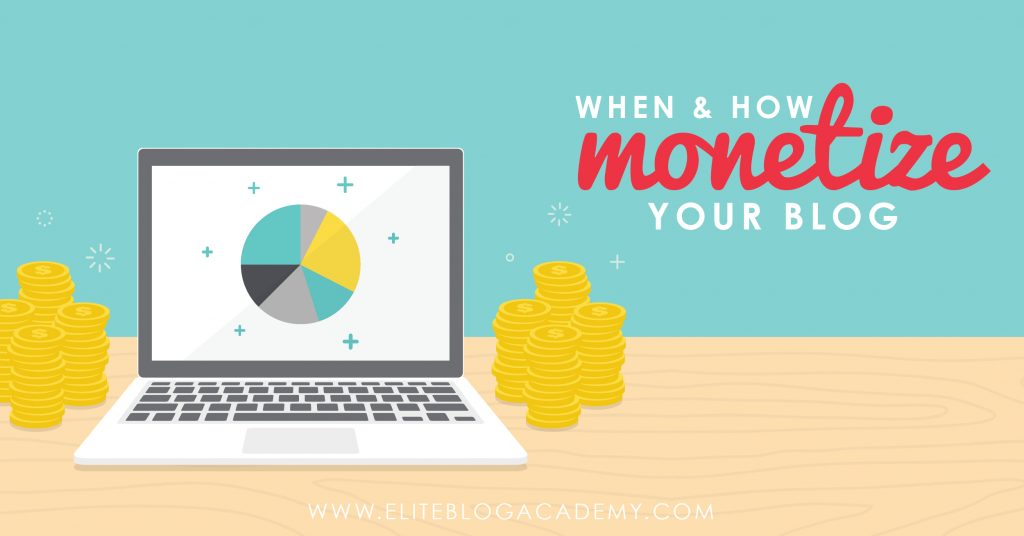
One of the most common questions I hear from our EBA students is this:
When is the right time to monetize my blog?
And my answer to that question is always pretty simple–as soon as possible….as long as you’ve laid the groundwork first! For your blog to become a business, it has to make money! If you’re unsure of when to monetize your blog, these tips will turn your blog into a money making machine. After all, blogging is hard work, and I tend to believe that the sooner you are getting paid for your efforts, the easier it will be to stay motivated to keep going, especially when the going gets rough (and it will, at some point!)
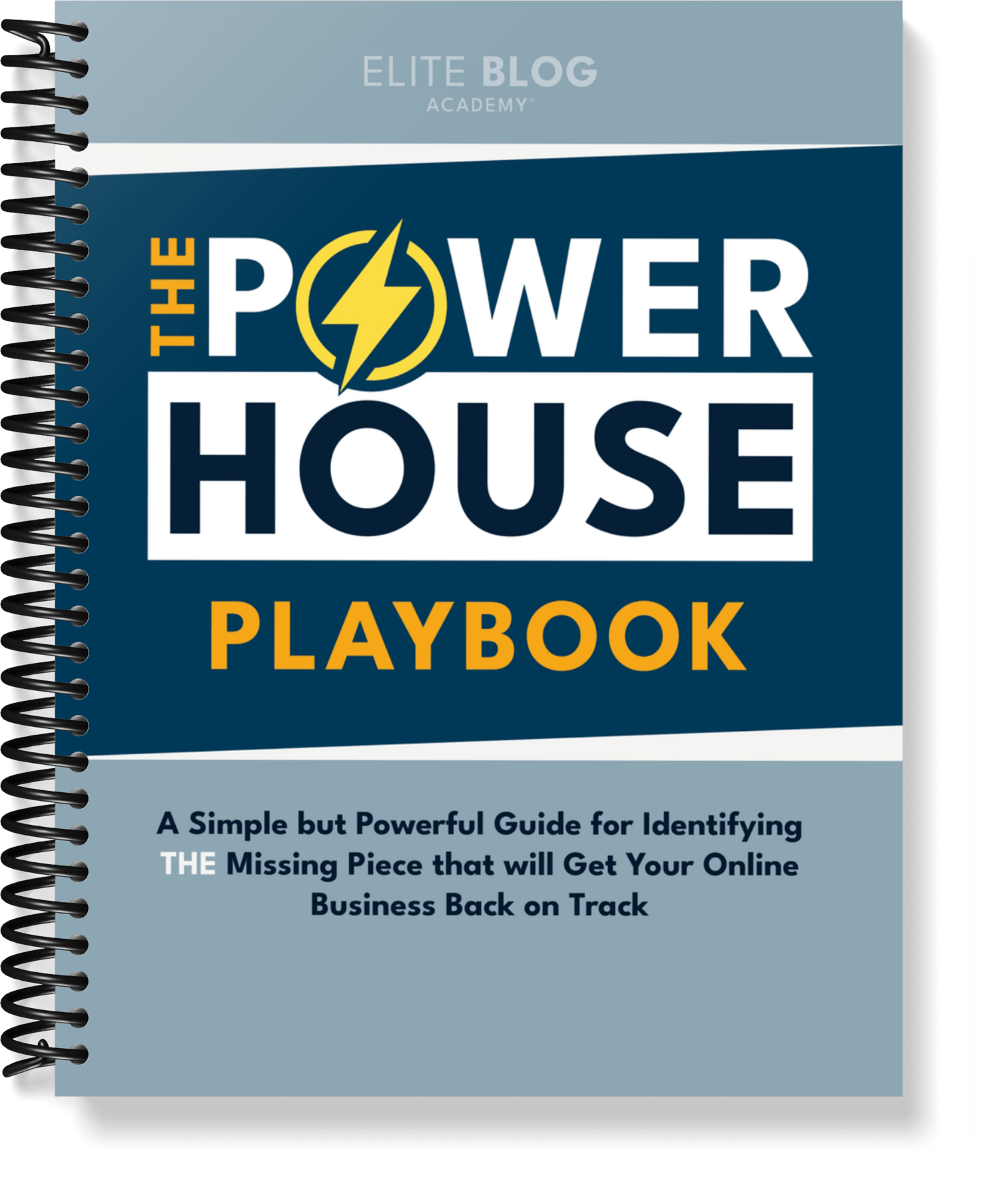
Do you ever feel like you are missing something?
Our newest free guide will show you the exact steps for identifying THE missing piece that will get your business back on track. Gain clarity and know what you need to do next to start getting traction again.
Of course, making money from your blog doesn’t always happen on day 1, or even on day 100, especially because a lot of bloggers are hesitant to monetize at all. They worry monetizing will make them look desperate or like a sellout. They worry about turning off the few readers they’ve managed to generate. They worry that their blog isn’t ready quite yet. Or, because they don’t know exactly how to monetize, they worry about looking like an amateur.
Most of all, they worry about “selling” to their audience.
Perhaps you’ve even experienced some of these thoughts.
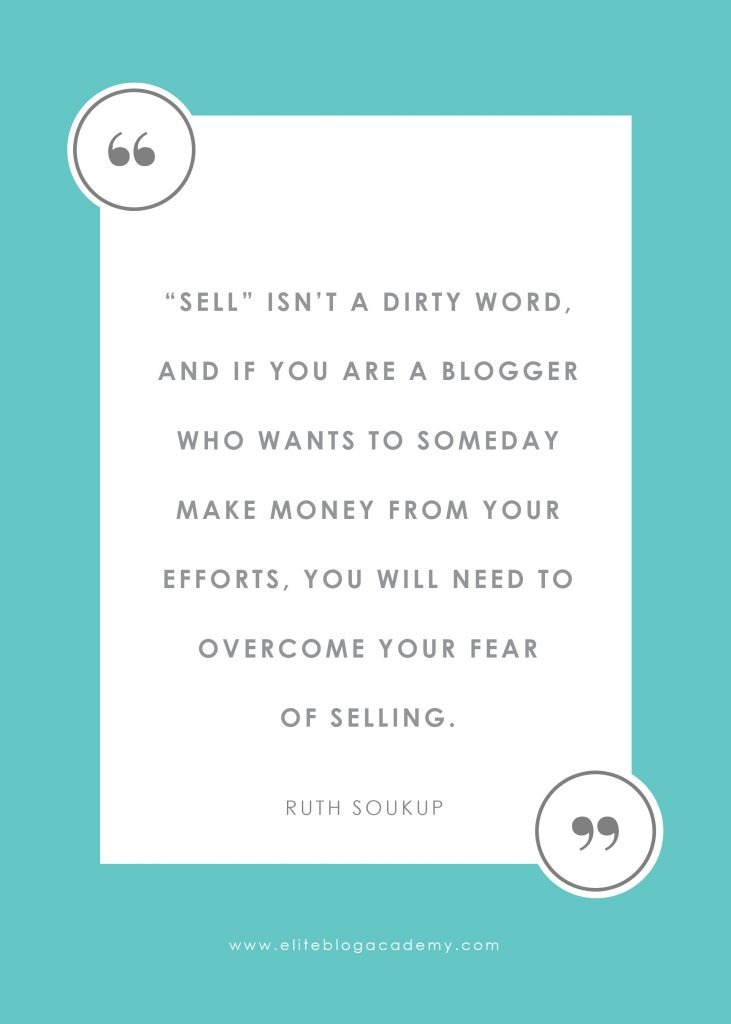 If so, regardless of whatever is making you feel hesitant about monetizing your blog, I’d like you to try to reframe that fear and think about it differently. “Sell” isn’t a dirty word, and if you are a blogger who wants to someday make money from your efforts, you will need to overcome your fear of selling.
If so, regardless of whatever is making you feel hesitant about monetizing your blog, I’d like you to try to reframe that fear and think about it differently. “Sell” isn’t a dirty word, and if you are a blogger who wants to someday make money from your efforts, you will need to overcome your fear of selling.
Let’s look at it a different way. Say you ate out at a restaurant or bought something on Amazon. Would you expect your waiter to apologize for bringing over the check and saying, “I’m sorry, I’d love to give you this for free, but I have to charge you for it”? Would you get angry when you had to enter your credit card information and pay for your purchase?
Of course not! Part of any business is monetizing and making money.
The reality is that people don’t tend to value what they don’t pay for. When someone has to pay for something, whether it’s content, a service, or a product, they value it more and take it more seriously.
If you truly believe you’re adding value to your readers with your blog, you have a responsibility to monetize. Not only will it help you by putting money back into your pocket, it will help THEM by forcing them to take things more seriously and act on the value you’re adding through your content.
That said, I don’t think it’s a good idea to focus on monetization from day one of starting your blog, even if your ultimate goal is to make money. At Elite Blog Academy, we teach a comprehensive framework for creating a successful, profitable blog–a proven framework that has helped thousands of bloggers create successful blogging businesses since 2014. That framework has four distinct phases: 1.) Refine Your Message, 2.) Grow Your Audience, 3.) Monetize Your Platform, and 4.) Build your Business.
As you can see monetization doesn’t happen until Phase 3, and that is very intentional, because there is some serious work that goes into laying the groundwork for successful monetization.
Pre-Monetization Checklist
Okay, so now you know you need to monetize, but before you monetize, you need a plan. Here are a few factors to consider:
Is your messaging tight and right?
Before you monetize, you want to make sure you’ve sufficiently refined your message. Ask yourself:
- Do I know who I’m writing to?
- Do I know their hopes and dreams?
- Do I know their problems?
- Do I know how my blog/product/service solves those problems?
- Are those problems people are actively looking for solutions for?
- Does my blog content address those felt needs and resonate with my readers?
- Does the presentation of my blog convey my message as well?
If you haven’t nailed the answers to those questions, it’s too early to monetize. Knowing your audience —and creating content that’s super tailored to them — is the foundation of a great blog, and if you try to monetize without a strong foundation, the whole blog could crumble.
Get to know your avatar inside and out. Refine your message. Then monetize.
(Quick note: refining your message is a continual process. As your avatar grows and evolves, so will your message.)
Have you focused on growing your audience?
I think we can all agree that it’s tough to monetize your blog when there’s no one to actually sell anything to. If you have no email list and no traffic, it doesn’t matter what kind of monetization strategy you’ve got in place… You will never make any money without an audience.
Before you monetize, it’s important that you focus on growth until a) you have a big enough audience to realistically generate sales, and b) you’ve nurtured that audience to the point that they’re willing to buy from you.
There’s no magic audience number where, once you cross the threshold, monetization makes sense. But a good rule of thumb is to have at least 1 – 2K people on your email list before you try to sell. With those kinds of numbers, you have a big enough pool of people to generate income. Now, obviously you want to continue to grow those numbers (NEVER stop growing your email list!), but once you have 1 or 2K subscribers, you can start putting different monetization strategies in place.
Ready, Set… Monetize!
When you’ve nailed down your messaging and you’ve got an audience to sell to, congratulations! It’s time to monetize.
While the possibilities are endless, there are four primary monetization options we recommend starting with:
#1: AD NETWORKS
Advertising Networks such as Google AdSense, Media.net, Lijit, Pulse Point, Burst, and BlogHer, work with a large number of advertisers, who pay the network to place their ad on your blog. Signing up is generally pretty straightforward and easy, but most companies do have an approval process that the vet applicants through.
Depending on the ad network, you could receive a pay-per-click payment, a CPM (cost per thousand views) payment based on the number of page views, or some sort of combination of those two things.
Profit through ad networks is largely considered passive income, meaning you don’t really have to do anything to earn it, but it is very dependent on page views. Another downside to consider is the fact that you have zero control over how the ad looks, so it may be totally out of line with your current website’s design.
#2: AFFILIATE SALES
Affiliate Sales, sometimes called affiliate advertising, is an ad or a link to a company or product that results in a commission IF the click through on that link results in a sale. This includes Amazon links or links to products on affiliate networks such as Commission Junction, ShareASale, LinkShare, PepperJam, or eJunkie.
Affiliate sales are a great option for promoting products you naturally would have written about anyways. For example, if you blog about natural remedies and write a lot about curing ailments with essential oils, then it is only natural to sign up as an affiliate of your favorite oil company to start bringing in money whenever people buy through your link. If you are unsure if the company you want to represent has an affiliate program, we suggest that you always reach out to them via email or phone because it never hurts to ask.
#3: PRIVATE ADVERTISING
Private Advertising is any paid ad or link on your site that is paid directly by the company doing the advertising, rather than by a network. It is generally one specific ad in one specific spot that stays up for a designated amount of time. Some bloggers use a service or dedicated marketing person to sell their private ads; others handle ad sales themselves.
Working directly with brands to promote their products is another popular monetization strategy. This can include sponsored posts (which are generally posts written on topics chosen by the sponsor), product reviews (which tell readers about your own experience), brand ambassadorships (which can involve multiple posts, giveaways, and social media promotions), conference
sponsorships, or paid product giveaways.
Private advertising is also another great way to let your readers about a product that you personally use and support and that is on-topic for your blog.
If you write about pets, and you have a certain leash you love, then it doesn’t hurt to reach out to the leash company to see if they’d be willing to sponsor a post or a giveaway or any of the other methods we suggest above.
#4: SELLING PRODUCTS
Selling products on a blog can include selling everything from original e-books or e-courses to handmade items, or even blog promotional items such as t-shirts, tote bags, and bumper stickers. This is different from affiliate advertising in that it involves selling your own products rather than someone else’s.
Selling a product could also include selling or marketing a service. Depending on your blog niche, this could include everything from hosting local classes and services (such as coupon classes or professional organizing or party planning) to online consulting services such as virtual home decorating services. This could also include social media consulting or virtual assistant work for other bloggers.
Additionally, many blogs are established for the sole purpose of building a platform that can then be used to launch a traditional writing and/or speaking career. Traditional publishers will often not even consider a book proposal if the author has not already established an online presence. Likewise, many successful speakers get their start by first writing a popular blog. While becoming an author or speaker may seem like a different avenue of monetization, the reality is that books and speeches are just another type of product.
WHEN TO BEGIN FOCUSING ON MONETIZATION
And I guess that brings us to the final question….are you ready to start monetizing?
The truth is that there is no set point where it is okay to start monetizing, just know that if you haven’t done the legwork of refining your message & making your blog a place worth visiting, and if you aren’t yet getting any traffic, you’re going to have a hard time making any money. It’s better to focus in the beginning on nailing down your content, writing quality articles that people actually want to read, and then driving traffic through SEO and social media, while you work on building your email list.
Keep in mind too that any ad networks and affiliate programs do have traffic or page view minimums, so you may want to set your own traffic targets accordingly. And when it comes to launching your first product, we think it is a good goal to have at least 500-1000 quality subscribers on your email list!
Just remember–blogging is a marathon, not a sprint. If you start with a firm foundation–an audience of raving fans that can’t wait to hear what you have to say–then monetizing is the easy part!
Once you’re ready to monetize, there are a few key points to keep in mind:
Monetize the traffic you have, not the traffic you wish you had.
Anyone can slap up a few ads on their page and call it a monetization strategy. But unless you’re getting a LOT of page views, that will probably not translate into any significant income. If you want to make real money from your blog, you need to monetize in a way that maximizes the traffic you already have.
If you want to make real money from your blog, you need to monetize in a way that maximizes the traffic you already have. #bloggingwisdomThat will mean different things for different people. For example, if you find affiliates in your niche that have a great product for your audience, that’s a really effective way to monetize, even if you have a small audience. Or, if you see a hole in the market, creating the perfect product that solves a major problem for your audience is a great way to monetize — no matter what size your audience.
Effective monetization really depends on what you’re selling. If you’re offering a service, like a 10K consulting package, you don’t need a huge audience because you only need a few customers to generate serious income. But if your revenue is based on how many clicks you get on your ads, obviously you will need a much bigger audience to make significant money.
Take a real, hard look at your audience and develop a monetization strategy that’s the right fit for where you are, not where you’d like to be.
Monetization is a marathon, not a sprint
When it comes to monetization, it’s important to think of it as a marathon, not a sprint. When you monetize your blog, it’s not a one-and-done kind of thing. You’ve got to be in it to win it and remain committed to optimizing your strategy over the long term.
For your blog to become a business, it has to make money! If you’re unsure of when to monetize your blog, don’t miss these tips on turning your blog into a money making machine.A lot of monetization is what I call the “throwing spaghetti against the wall” phase — you will throw a lot of things at the wall to see what sticks. Some things will work, some things won’t. As a blogger, you should expect to be in this phase for a long time.
But people get scared. They throw something at the wall, it doesn’t stick, and they write off monetizing their blog because that one piece of spaghetti didn’t stick. However, there’s TONS of spaghetti to throw, and if you want to successfully monetize your blog and make a significant income, you need to always be trying new things.
Look, I get it: it can be exhausting, this period of testing to see what works and what doesn’t work. But it’s necessary. There’s no one-size-fits-all strategy to monetization, and sometimes what you think will work ends up completely bombing.
At this point, I try to keep myself from making too many assumptions about monetization strategies. There have been so many times when the things I thought would be a slam dunk for my audience fall completely flat and things that I thought would be a total bust end up driving tons of revenue.
Throw spaghetti at the wall, see what sticks. Then, once you know what sticks, keep making those things better and better. Keep refining your message to make it an even better fit for your audience.
You Win Some, You Lose Some
Part of being a successful entrepreneur — which you are, as a blogger monetizing your blog — is taking risks and understanding that when it comes to risks, you win some, you lose some. Not every decision you make will be a good one, and that’s okay, because it is all part of the process. You will have some major wins with monetization, and that’s great. But you will also have some major losses. And guess what? That’s great, too. Get used to winning and losing, because both will happen.
Start with small risks. That way, your wins and your losses will be small. As you get used to those smaller risks and those smaller wins and losses, you can work up to bigger risks and bigger wins and losses.
For example, when my team and I first launched the Living Well Planner, our first physical product, in 2015, I had to write a check for $400K just to get the first shipment out the door. $400K! That much money could buy a house — a really nice house, at that! At that point it was by far the biggest check I had ever written, and let me tell you, I had more than a little heartburn writing it. It was a HUGE risk.
And honestly, if I had taken that kind of gigantic risk on day one of my business, I don’t know that I would have been successful. At the very least, I would probably still be in debt up to my eyeballs. Taking a $400K risk is not something you want to do on your first day (or first year) in business.
But I had spent years taking smaller risks, throwing spaghetti at the wall, and seeing what stuck. I got to know my audience. I learned what worked and what didn’t. I knew my audience, my business, and my monetization strategy in and out. I built up my confidence and my courage through small wins.
We had been creating digital planners for our audience since 2011, and by 2014 we had so many readers who were asking for a physical version of our planner, that we knew the time was right to make a big move. And, by that time, we had created enough equity through other monetization strategies that even if the planner was a flop, I knew it wouldn’t destroy me or my business.
We built up to it, and that’s what gave me the courage to take that giant step.
So when it comes to monetization, start small. Throw that spaghetti and see what sticks. Learn the ins and outs of what works with your audience and what doesn’t. Get to know your avatar. Refine your message. Get comfortable winning, get comfortable losing, and take bigger risks. Give in to the process, and understand that monetization is a marathon, not a sprint. When you follow these steps, I promise: you’re on your way to monetizing in a big way.

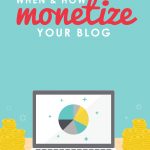

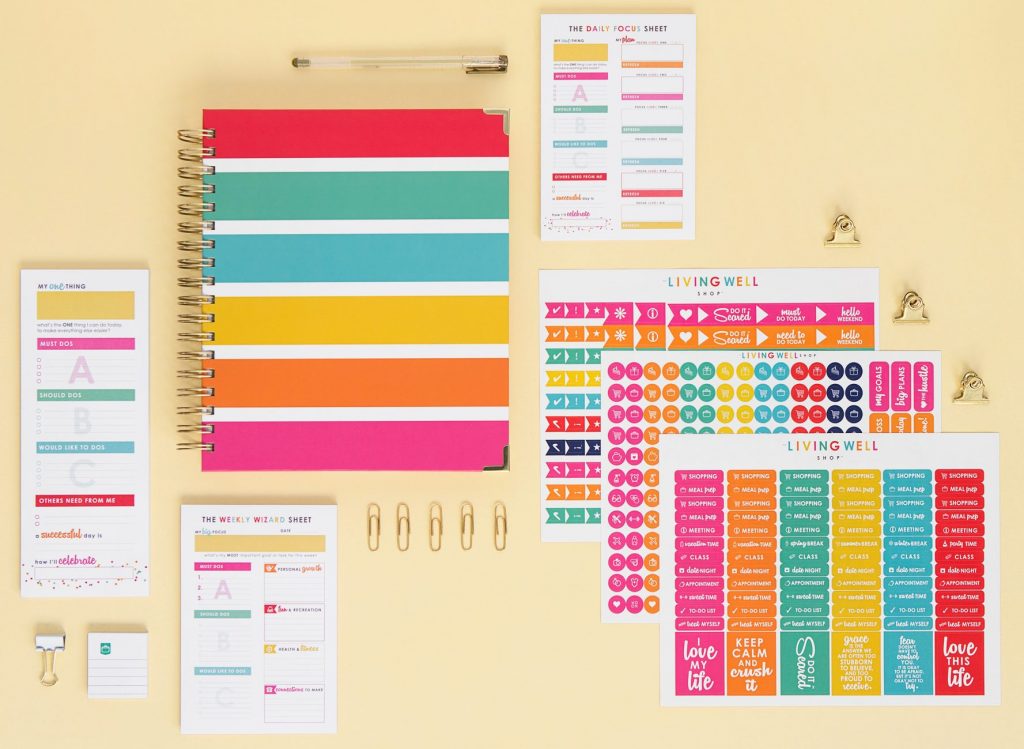
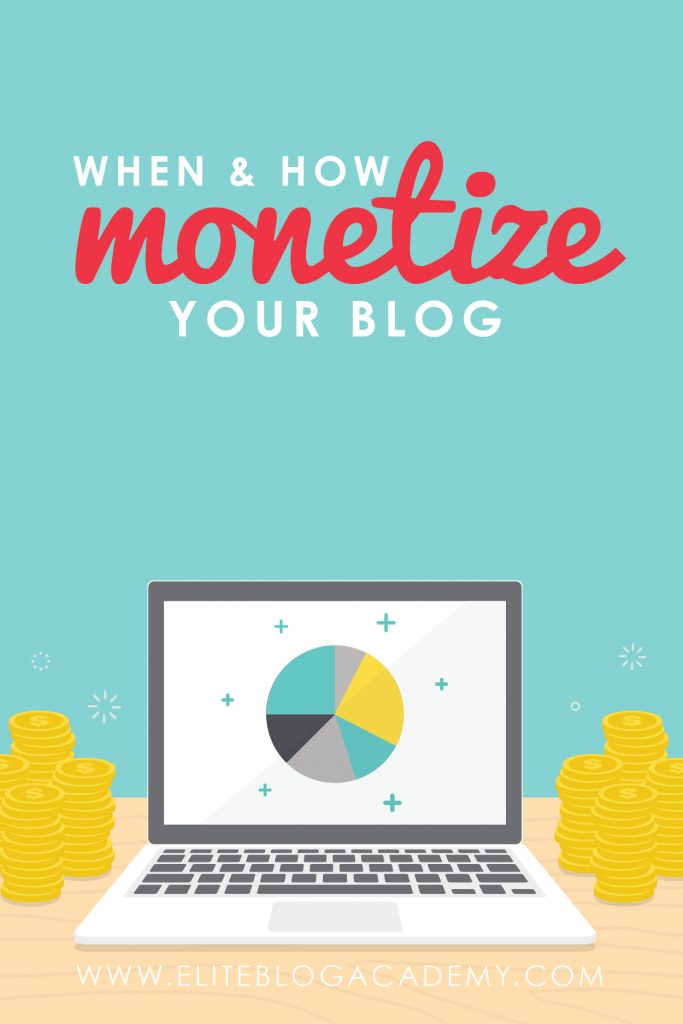
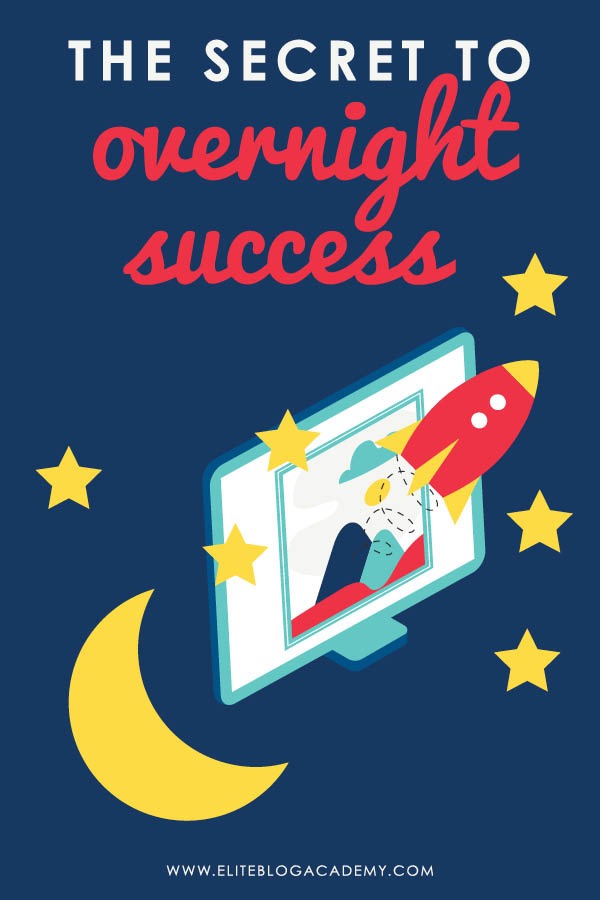
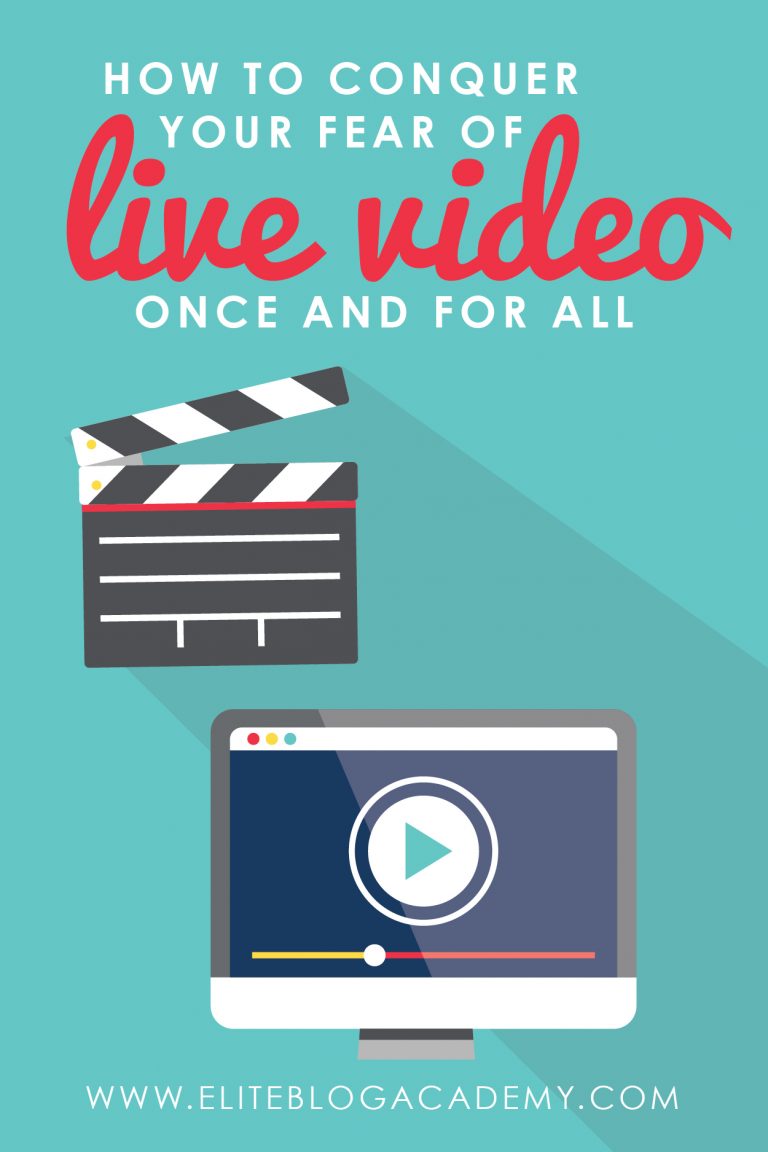
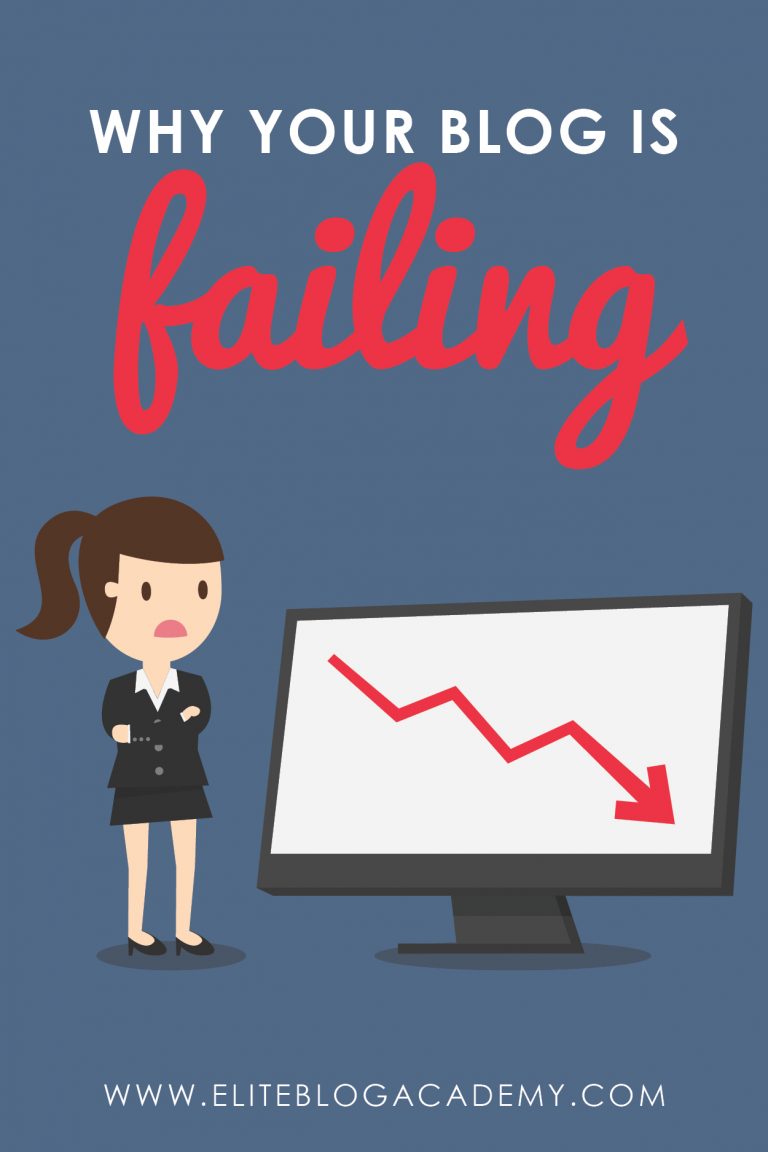
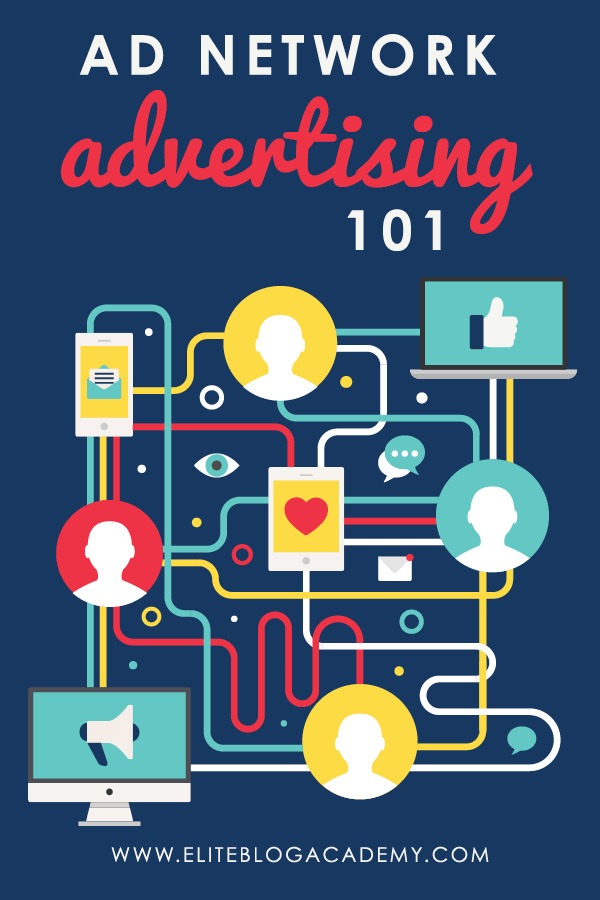
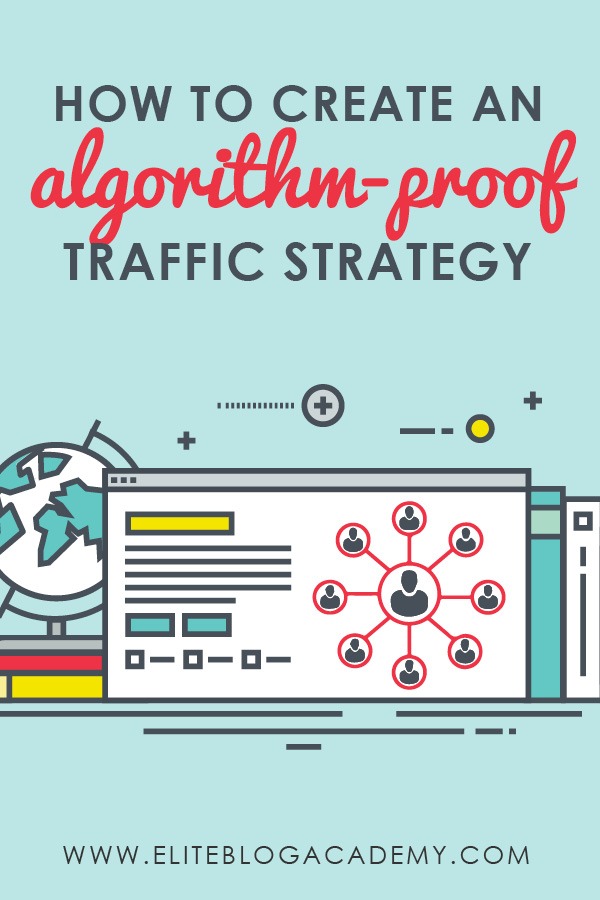
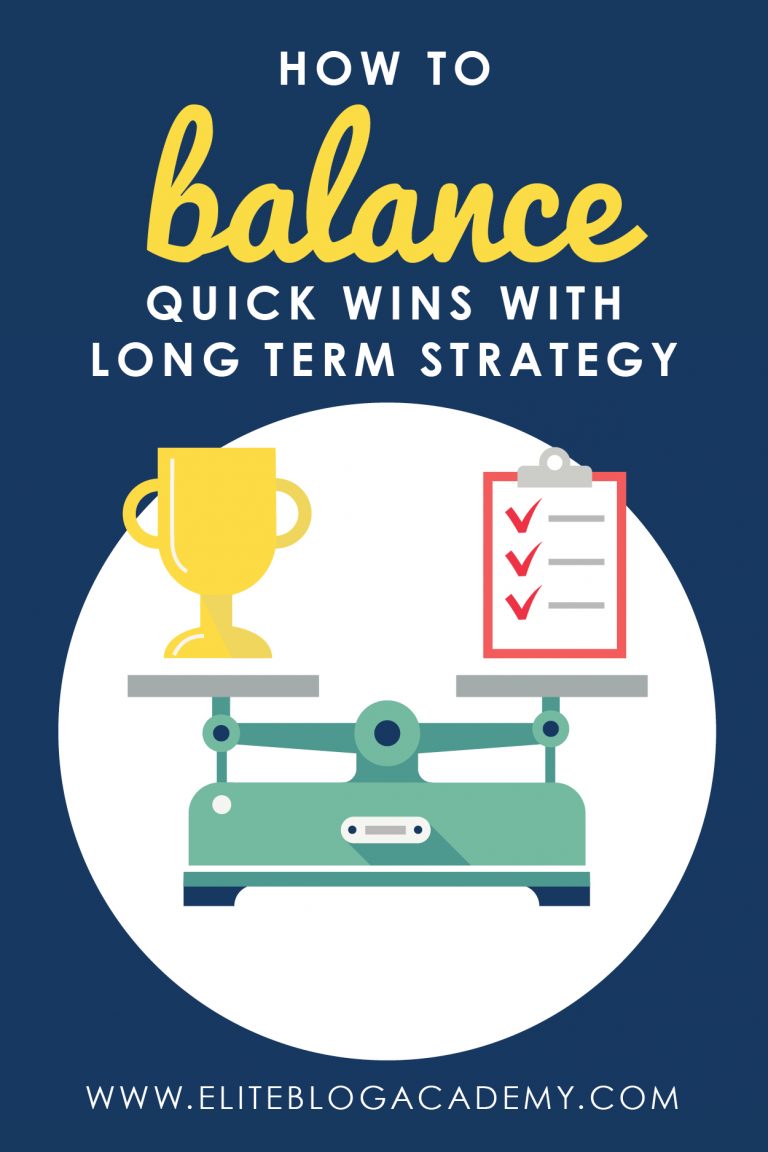
This is great advice! It helped clarify so much for me, but I do have a question.
I’m an author. I write fiction and nonfiction books about intimate relationships. I’m really new to blogging and honestly haven’t launched yet, but hope to soon. My question is this- being that I’m so new to the blogging world, should I wait to publish my books? I have three different manscripts that have been edited and could realistically be published within the next few months. Since I currently have no following other than the people who read my first book (they aren’t on an email list), do I need to hold the new books until I have an email list? Will launching a blog with products hurt my brand and dissuade people from joining my list? Thank you!
I am in the group of readers who have not yet launched their blogs. As I am working on my content and planning out the hows (what it will look like; how often to post; and the whos (who exactly is my audience) of the blog, I can see that what I am teaching/encouraging, and modeling for parents and children (to promote family literacy and quiet parent-child bonding time) lends itself to one type of monetization immediately.
Even though there is no audience yet, and I don’t know how long it will take to build it up, since I will be promoting specific books, I see an opportunity (a need even) to affiliate with whichever booksellers will work with me, to allow readers to click on a title from a list of age, grade, or genre specific books, so they can shop for said title.
Is this an appropriate monetizing activity for a brand new blog?
At this point, I have no product or service to sell, and I believe selling such would be more appropriate at a later date, when I have a somewhat loyal readership, and hopefully, a growing audience as well.
Thank you for your practical content and for sharing of your own experiences. I enjoy reading your blog and applying what I learn as I am working toward launching my own.
It’s never a bad idea to include referral links where it makes sense, even if you are just starting out. The problem comes when your sole focus is trying to monetize before you’ve had time to refine your message and grow your audience a bit. It’s certainly not going to hurt you to have those links in place, even if you don’t have a lot of clicks on them just yet! 🙂
Trying to launch my blog and this has been a question for some time.
Now, you mentioned that you should not start monetizing right from day one when you don’t even have an audience. Well, I’m wondering then if having referral links to programs and resources I use would be considered a No-No for me? I haven’t launched my blog yet, thus no audience, but my content already includes some referral links, as well as some freebies I created. Is that a bad idea?
Wow! I have been struggling with monetizing my blog for a while but simultaneously trying to niche down and get to know my target audience. Thank you for posting those questions about my message… I have a lot of work to do before getting in over my head about money. 🙂